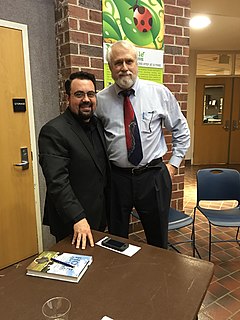A Quote by James Cameron
I've sworn off agnosticism, which I now call cowardly atheism. I've come to the position that in the complete absence of any supporting data whatsover for the persistence of the individual in some spiritual form, it is necessary to operate under the provisional conclusion that there is no afterlife and then be ready to amend that if I find out otherwise.
Related Quotes
Obviously, if theism is a belief in a God and atheism is a lack of a belief in a God, no third position or middle ground is possible. A person can either believe or not believe in a God. Therefore, our previous definition of atheism has made an impossibility out of the common usage of agnosticism to mean "neither affirming nor denying a belief in God."
I don't know whether God exists or not. ... Some forms of atheism are arrogant and ignorant and should be rejected, but agnosticism—to admit that we don't know and to search—is all right. ... When I look at what I call the gift of life, I feel a gratitude which is in tune with some religious ideas of God. However, the moment I even speak of it, I am embarrassed that I may do something wrong to God in talking about God.
But lack of evidence, if indeed evidence is lacking, is no grounds for atheism. No one thinks there is good evidence for the proposition that there are an even number of stars; but also, no one thinks the right conclusion to draw is that there are an uneven number of stars. The right conclusion would instead be agnosticism.
Our ignorance of the cosmos is too vast to commit to atheism, and yet we know too much to commit to a particular religion. A third position, agnosticism, is often an uninteresting stance in which a person simply questions whether his traditional religious story (say, a man with a beard on a cloud) is true or not true. But with Possibilianism I’m hoping to define a new position - one that emphasizes the exploration of new, unconsidered possibilities. Possibilianism is comfortable holding multiple ideas in mind; it is not interested in committing to any particular story.
I find it rather tedious working with some actors who have to go into a corner and bounce up and down, shake their hands and arms, saying to the director, "Just a second - I'll be ready in a few minutes, " while all the other actors are waiting around to get in. Then they say, "OK! I'm ready now." And then they come on and do it exactly the same way they've done it in rehearsal.





































